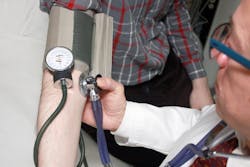COVID-19 significantly impacts health services for noncommunicable diseases
Prevention and treatment services for noncommunicable diseases (NCDs) have been severely disrupted since the COVID-19 pandemic began, according to a World Health Organization (WHO) survey just released. The survey, which was completed by 155 countries during a three-week period in May, confirmed that the impact is global, but that low-income countries are most affected.
This situation is of significant concern because people living with NCDs are at higher risk of severe COVID-19-related illness and death. The main finding is that health services have been partially or completely disrupted in many countries. More than half (53 percent) of the countries surveyed have partially or completely disrupted services for hypertension treatment; 49 percent for treatment for diabetes and diabetes-related complications; 42 percent for cancer treatment, and 31 percent for cardiovascular emergencies.
Rehabilitation services have been disrupted in almost two-thirds (63 percent) of countries, even though rehabilitation is key to a healthy recovery following severe illness from COVID-19.
In the majority (94 percent) of countries responding, ministry of health staff working in the area of NCDs were partially or fully reassigned to support COVID-19. The postponement of public screening programs (for example for breast and cervical cancer) was also widespread, reported by more than 50 percent of countries. This was consistent with initial WHO recommendations to minimize non-urgent facility-based care whilst tackling the pandemic.
But the most common reasons for discontinuing or reducing services were cancellations of planned treatments, a decrease in public transport available and a lack of staff because health workers had been reassigned to support COVID19 services. In one in five countries (20 percent) reporting disruptions, one of the main reasons for discontinuing services was a shortage of medicines, diagnostics and other technologies.
Unsurprisingly, there appears to be a correlation between levels of disruption to services for treating NCDs and the evolution of the COVID-19 outbreak in a country. Services become increasingly disrupted as a country moves from sporadic cases to community transmission of the coronavirus.
Globally, two-thirds of countries reported that they had included NCD services in their national COVID-19 preparedness and response plans; 72 percent of high-income countries reported inclusion compared to 42 percent of low-income countries. Services to address cardiovascular disease, cancer, diabetes and chronic respiratory disease were the most frequently included. Dental services, rehabilitation and tobacco cessation activities were not as widely included in response plans according to country reports.
Seventeen percent of countries reporting have started to allocate additional funding from the government budget to include the provision of NCD services in their national COVID-19 plan. Also encouraging is that more than 70 percent of countries reported collecting data on the number of COVID-19 patients who also have an NCD.

